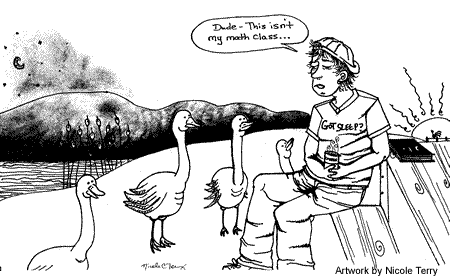
Lack of sleep can affect students' ability to learn
By Eric Rose
Staff Writer
 Many
college students feel the effects of sleep depravation on a daily basis.
Some consider it part of the college experience.
Many
college students feel the effects of sleep depravation on a daily basis.
Some consider it part of the college experience.
However, experts agree that prolonged episodes of sleep deprivation can
have a bad effect on the mind and body.
According to the 2002 "Sleep in America" poll conducted by the
National Sleep Foundation (NSF), only 30 percent of Americans sleep eight
or more hours a night.
The NSF says that adults need between seven and nine hours of sleep a
night. The average American sleeps 6.9 hours a night.
Adults ages 18-24 are the group most affected by insomnia (the inability
to sleep regularly). The NSF says that 35 percent of Americans experience
insomnia every night.
Only 33 percent of those surveyed claim to sleep "good," and
only 10 percent report "excellent" sleep.
Sleep deprivation occurs when a person goes without sleep for an extended
period of time. According to Shannon Pruitt, sleep lab coordinator at
the Sleep Research Center of Floyd Medical Center, some of the causes
for sleep deprivation in college students are late night studying, stress
and partying.
According to the NSF, some warning signs of sleep deprivation are:
|
|
|
|
|
|
|
|
|
|
|
Pruitt said that sleep deprivation affects the reflexes
and the ability to stay awake during the day.
"After a while your body just shuts down and your brain stops functioning
properly. It can make other illnesses worse," said Pruitt.
Some try to control the effects of sleep deprivation with caffeine, a
stimulant which some people claim helps them stay alert when they are
feeling tired.
However, according to Pruitt, caffeine makes a person's brain waves faster.
Caffeine also has harmful side effects. It is bad for the nervous system,
and it is also bad for the kidneys because it affects the body's ability
to process water. Caffeine is also bad for the heart, because it speeds
up the heartbeat.
Use of caffeine is also a contributing factor to cancer.
"In the long run, caffeine works to hinder you," said Pruitt.
In a study entitled "The Relationships between Sleep-Wake Cycle and
Academic Performance in Medical Students" by Ana Ligia D. Medeiros,
Patricia F. Lima and Denise B.F. Mendes, results showed that students
who sleep regularly are more likely to perform better academically.
"Students who showed a more regular sleep-wake cycle and longer sleep
length reported better academic performance," the study stated. "The
results that showed worse academic performance in students who had irregular
sleep-wake cycles and shorter sleep lengths could reveal only one part
of the consequences."
When asked how students can help prevent sleep deprivation, Pruitt said,
"They need to have good sleep hygiene-going to bed and wake up at
a certain time-even on weekends."
Pruitt also suggested that students keep a sleep diary.
She said, "Write down when you sleep, when you wake up, your mealtimes,
and any naps during the day, and take this with you to your doctor."
| Front Page | News | Editorials | Opinions | Features | Sports |
| Archives | Our Staff | Application | History | F.A.Q.'s |
![]()
Copyrighted © 1999-2001 Six Mile Post
All Rights Reserved
